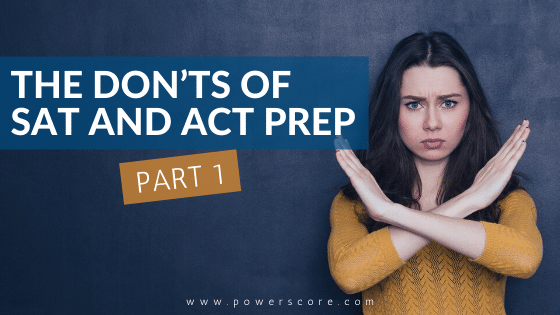Don’t Take It Cold
Yesterday I had a phone call from the mom of a rising-junior.
“I just want him to take the SAT to see how he does. Then we’ll decide how much study he needs.”
Hey, while you’re at it, have him submit a rough draft of his essay with his college application?
I didn’t really get sarcastic, but I wanted to. The idea of taking an officially-administered SAT as a practice test is ludicrous. Instead I politely explained that if her son had a sub-par performance, his college application would take a hit.
“Well, he’ll just use Score Choice,” she reasoned.
That could be a great plan! But only if all of your prospective colleges accept Score Choice. Many colleges still require that you send test scores from every official administration. Plus, most universities will superscore your results, meaning admissions officers take the highest section scores from different tests to compute the best composite score. So say Johnny Junior gets a 520 Math, 660 Reading, and 600 Writing in March, and he turns in a 630 Math, 630 Reading, and 650 Writing in May. His super score is a 630 Math, 660 Reading, and a 650 Writing. If you utilize Score Choice, you limit your own potential. (To find out how colleges use scores, check out this report published by the College Board).
When you take your first official SAT or ACT, be sure that you are 100% prepared and ready to master the test. Discover your initial practice score on a practice test, not on the real thing.
Don’t Use Simulated Tests
The College Board has released 10 official tests in The Official SAT Study Guide and the ACT has published 5 tests in The Real ACT Prep Guide. Buy these books. Work through the tests. Compute your scores. If you need more tests, you can find free official tests in our Free Help Area.
But do not buy books written by test prep gurus with “complete practice tests.” While simulated questions are good for teaching and practicing specific concepts, they are poor for helping you compute an accurate practice score. The authors of these tests are not likely psychometricians, those PhD-wielding statistical-loving educational psychologists who write standardized tests, nor are they psychometric employees of the College Board or of ACT. They can guess at what goes into a full-length test and at its resulting score curve, but they cannot know for sure and they cannot accurately predict your real score.
Don’t Cram
Intense studying the day before the SAT or ACT is akin to an athlete running 50 miles the day before a marathon. Professional athletes taper their workout in the days before competition, and you should taper yours, too. If this idea causes panic or anxiety, then flip through your Vocabulary or Math Flashcards one last time the day before the test, but do not strain your brain. It needs a 24-hour break in order perform at its peak ability on test day. After all, if Johnny Junior follows our advice about preparing for the SAT or ACT, what he’s learned in the months prior to the test is not going to be forgotten in a single day off.
Don’t forget to read Part 2: The Don’ts of SAT and ACT Prep!


Leave a Reply
You must be logged in to post a comment.